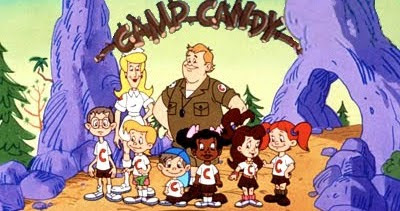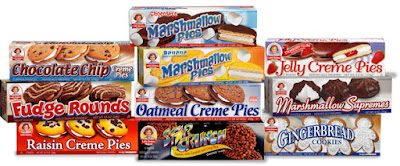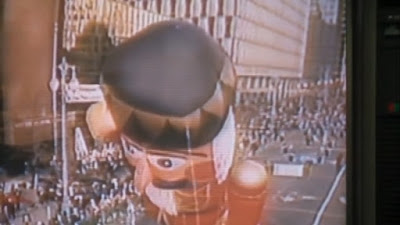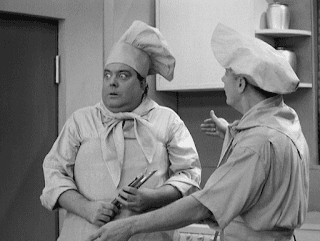One morning before school in 1992, I caught a few minutes of a cartoon I had never seen before. It caught my attention, and I was so invested in watching that I was almost late for the school bus. When I got to class, I immediately asked my friends if they had ever seen it. One bragged that he'd been watching the show for a long time about it and made it seem like I was missing out on something big for quite a while. I really enjoyed the show that morning, but unfortunately, finding it again proved difficult. It seemed that the television schedule changed, or maybe I caught the final episode or something else, but somehow it was several more months before I found another episode.
Remember, kids, this was before Google and YouTube and on-demand streaming!
That show was called "Camp Candy."
Camp Candy holds a special place in the hearts of many who grew up in the late 80s and early 90s. The animated series, created partly by the legendary comedian John Candy, took viewers on an adventure to a humorous summer camp full of fun, friendship, and important life lessons. Each episode centers around the campers and the mischief they find themselves in each day. Filled with loveable characters, wacky escapades, and timeless messages, Camp Candy is a cherished, albeit brief, part of many childhoods of my generation.
In this series, John is the loveable head counselor at a kid's summer camp. Set in the tranquil beauty of the "great outdoors" at Camp Candy, the cartoon series fits in right at home with this year's Camp YesterYear theme. The Great Outdoors, by the way, is an all-time classic John Candy film you should go out of your way to watch.
Beyond the entertaining storylines and enjoyable characters, Camp Candy was known for providing a valuable life lesson with each episode. As was customary for cartoons of the time, these life lessons and moral guidance were woven seamlessly (ok, they were sometimes hamfisted) into each episode. Camp Candy included lectures on friendship, teamwork, responsibility, and environmental awareness for its young audience. With Candy's sense of humor, these messages were delivered with a light touch, ensuring they resonated without being preachy.
When getting the show into production, the story goes that Saban Entertainment pitched the concept for an animated summer camp series to NBC. During the pitch, the camp counselor was described as "a loveable, bumbling man similar to the actor John Candy." The then Vice President of Children and Family Programming was Phyllis Tucker Jackson. Phyllis liked the idea and said, "If you can get John Candy to do the voice, I'll order the show." Candy quickly agreed to do the show when asked, noting that he wanted to do something his children would enjoy.
Marking his first foray into the animated world, John Candy brought his comedic skills and genuine midwestern "folksy" warmth to the series. His voice acting on the show really shines on his ability to be funny and self-deprecating while being caring and giving at the same time. Looking back on it, I like to think his decision to work on Camp Candy was not just for his own kids to enjoy but because of his desire to bring laughter and joy to people of all ages.
The famed comic had already become popular on the classic sketch comedy television show SCTV and in feature films like Uncle Buck and Planes, Trains, and Automobiles. Most children of my generation first witnessed John Candy's comedic chops in his appearance in November 1990 as "The Polka King" Gus Polinski in Home Alone. That role, by the way, was 100% improvised by Candy. He also reportedly only received $414 for the role, a supposed sticking point for the remainder of his life.
Camp Candy aired twenty-seven episodes from 1989 to 1991 on NBC. Thirteen additional episodes were created for syndication in 1992, along with repeats of the previous episodes. The thirteen additional episodes also featured short live-action segments. In 1998, the entire series would air in reruns on the Fox Family cable channel for a short time.
I think this series would still resonate with an audience of any age today. The show's themes are universal and capture the joy of childhood summers and the adventures of the great outdoors. Candy's legacy will forever be bound to this cartoon, even though it gets lost in his large body of work.
The "actual" Camp in the show was a summer sleep-away camp owned and operated by John Candy. Like many camps, it offered fun activities like boating, swimming, and fishing. Unlike other camps, though, this one had various crazy characters that visited from time to time. The campers were the standard fare of cartoon kids from the 90s, ensuring every personality was represented. The group of children included Robin McClain (the nature lover), Alex Dawson (the tomboy), Vanessa Van Pelt (the rich girl), Iggy Jones (the nerdy hypochondriac), George "Binky" Jones (the adventurer), and Ricky Quimby (the prankster.)
The cartoon camp even had its own villain, Xavier "Rex" DeForest, III. Rex, a millionaire, and land developer, desires the Camp's acreage for future luxury apartments. Rex employed a dimwit goon named Chester, who was always happy to do Rex's bidding. Another antagonist was John's rival from Camp Kickboot, Bob Nayles. Nayles was a strict disciplinarian and the head counselor at Kickboot.
In each episode, Candy tries to teach the children something about nature, often using the "this reminds me of a story" trick that leads to a narrated tale told by Candy. Often using the evil developer Rex as a catalyst, Candy would take a brief moment out in each episode to teach the audience about ecology and saving the environment.
Another favorite part of the series for many children was the theme song, written by Harry Nilsson and sung by Nilsson and Candy. Today, in 2023, it's not at all what I'd call "great," but as a kid, I LOVED to sing along.
Take a listen down below!
The series never became hugely popular, but many still fondly remember it. "Wish Upon a Fish," the fifth episode of Season Two, even won the Humanitas Award. According to Wikipedia, "The Humanitas Prize is an award for film and television writing, and is given to writers whose work explores the human condition in a nuanced and meaningful way."
I enjoyed Camp Candy as a child and still think it holds up today because it embodied so much of what made John Candy a beloved pop-culture icon. His kindness and gentleness gave his humor a warmth not often found in celebrities today. It wasn't until many years later that I appreciated his wit, timing, and improvisational skills, and unfortunately, by then, it was too late. Imagine, had he not passed away in 1994, how much greater could his already legendary career have been? I'd love to know what he thought about today's society and hear his humorous commentary on it.
A short-lived comic book published by Marvel Comics was also created based on the show entitled "Camp Candy."
A collection of episodes have been saved on archive.org.
The embedding feature has been a bit buggy lately, so you can visit the archive.org website and watch Camp Candy HERE!









.png)




Comments